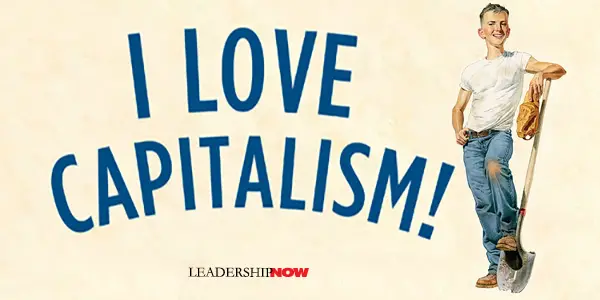 |
 |
07.02.18

I Love Capitalism!
I Ultimately capitalism is about personal responsibility, ownership, and commitment. That can be hard to swallow in an age that encourages entitlement. Ken Langone, the now-billionaire co-founder of Home Depot among other accomplishments, wrote a book titled, I Love Capitalism! An American Story. Shallow thinking might lead you to say, “Well yeah. Of course, he loves capitalism. What billionaire wouldn’t?” But there is a more than that to his life’s story. Capitalism works. And—I’m living proof—it can work for anybody and everybody. Blacks and whites and browns and everyone in between. Absolutely anybody is entitled to dream big, and absolutely everybody should dream big. I did. Show me where the silver spoon was in my mouth. I’ve got to argue profoundly and passionate: I’m the American Dream. And so begins Langone’s story of the American Dream. His parents—Angie and John—“were very simple people. Neither of them ever got close to graduating from high school. My mother dropped out in the seventh grade. My father didn’t want to work in the sand pits, so he went to trade school and learned to be a plumber.” He has said, “You work hard. You work smarter. And maybe you lower your sights, but you get on a ladder. There has to be something inside you to make you push.” Again, you have to take ownership if you are going to accomplish anything worthwhile. Langone had help along the way. As a freshman at Bucknell he wasn’t doing well in school. His economics professor took him aside and told him that if he applied himself and work hard, he would talk to the other professors on his behalf. He did. Professor Headley told the others, “Look, I think this kid is a diamond in the rough, and I think we ought to make the effort to try to pull him out of his nosedive.” He confesses he would not be where he is today without his help and direction. Kai Ryssdal of Marketplace, asked Langone “What do you do if you're somebody in this economy, and there are many of them, who don't have people to help them out?” Langone replied: “I feel very sorry for them. What do I do? I think there couldn't be a more lonely existence to not have at least one person in your life, at any one point in time in your life, that you couldn't pick up the phone or you couldn't go see and say, "Hey, what do you think?" Or "I need your help." Or "Can you do this for me?" Or "Can you do me this favor?" So that description, you tell me about that person, that’s a very sad — I will tell you this though, and I don't mean this in a lecturing way: My father had a wonderful expression. He said if you want to have a friend, you got to be a friend. So maybe that fellow wants to take a step back and ask himself the question, what has he done to nurture those kinds of friendships and relationships?” Again, personal responsibility, ownership, and commitment. He writes: Some guys who get wealthy like to brag about being self-made men. I can’t imagine they’re not leaving somebody out of that equation. The thing I can’t say and never will say is that I’m self-made. To make that claim, would be to commit a grave sin against all the many, many people who helped me get to where I am. Langone’s story is a story of putting himself in place to better himself, to learn what he needed to learn, paying attention, and building relationships. There was luck along the way to be sure, but as Louis Pasteur said, “Chance favors the prepared mind.” Langone followed his interests. He found work that gave him experience and trained him to better understand and expand his interests and talents. With 40% of college graduates going into finance, he tells them that that’s a big mistake. “I tell them they should learn the nuts and bolts of a business before going out and trading that business’s stock. I didn’t realize how stupid I was back then when I was a salesman at Pressprich! I would look in the most superficial way at the companies whose stocks and bonds I was selling: I never truly understood how those businesses worked. It wasn’t until I got wealthy enough to buy pieces of companies that I developed a much deeper understanding of them.” Here are a few lessons he learned along the way: Supply and demand goes through everything in life. Early on I caught the fact that if you have a special talent, or if you have something unique that provoke people to do something that you can make a profit on, that’s a good thing. 
Posted by Michael McKinney at 07:54 AM
|
BUILD YOUR KNOWLEDGE
 

How to Do Your Start-Up Right STRAIGHT TALK FOR START-UPS 
Grow Your Leadership Skills NEW AND UPCOMING LEADERSHIP BOOKS 
Leadership Minute BITE-SIZE CONCEPTS YOU CAN CHEW ON 
Classic Leadership Books BOOKS TO READ BEFORE YOU LEAD |